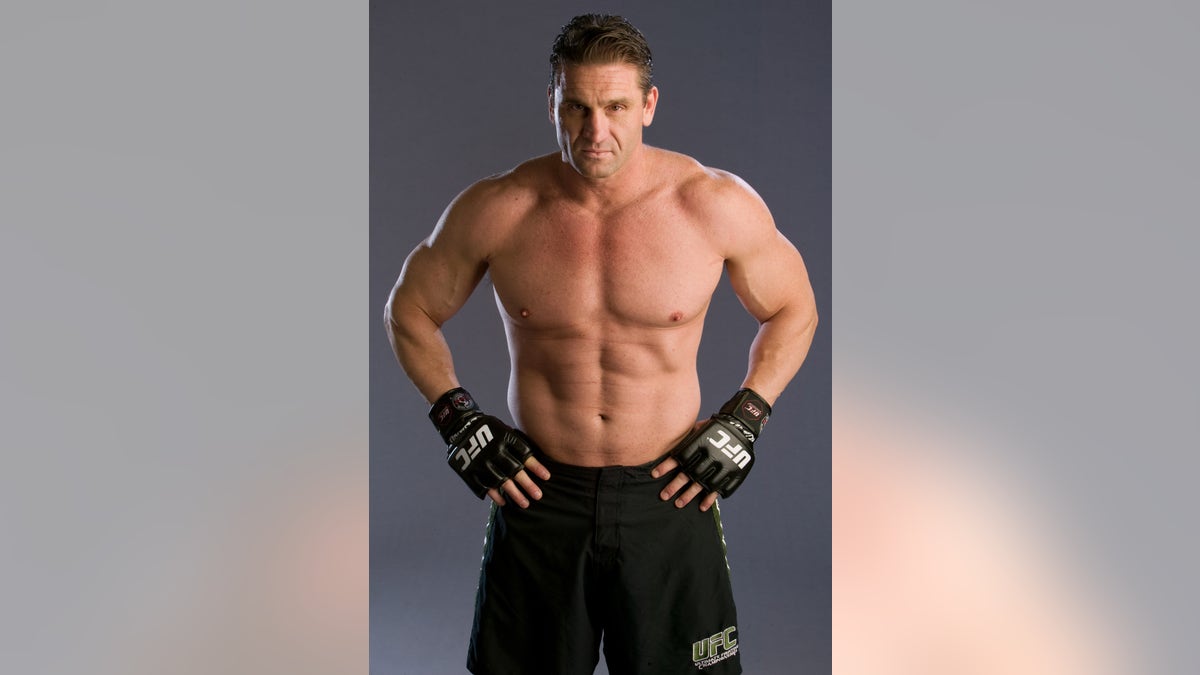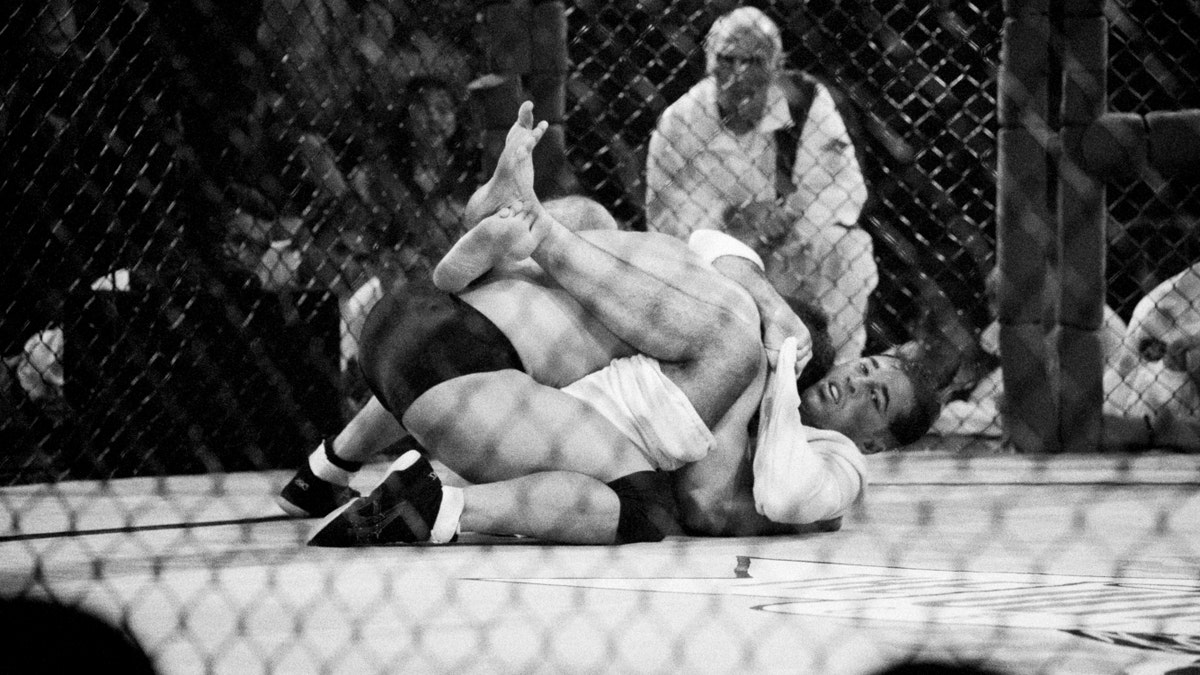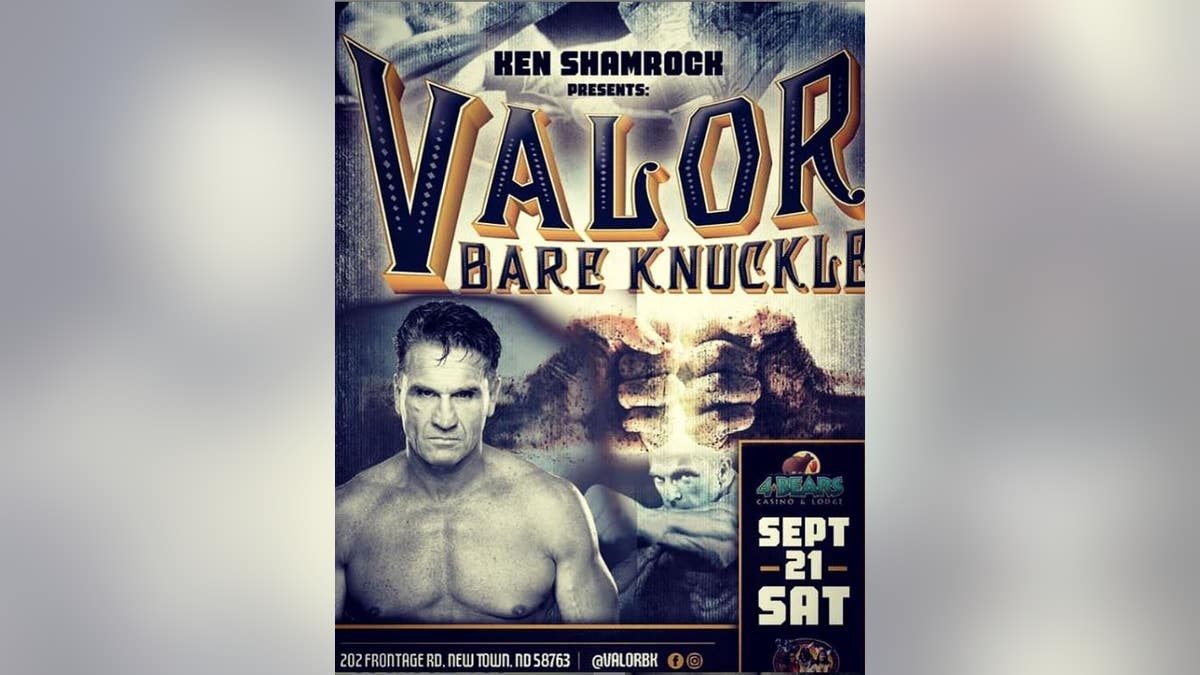How UFC Hall of Famer Ken Shamrock became ‘The world’s most dangerous man’
Ken Shamrock has dominated in the world of fighting sports becoming a UFC hall of famer, making his mark in the wresting arena and reviving the sport of bare knuckle pit-fighting. This is the story of how Shamrock became ‘the world’s most dangerous man.’
In the world of fighting sports, there is a name that garners respect around the world - and that name is Ken Shamrock.
For years, Shamrock was one of the biggest stars in the UFC and after transitioning to the WWF, he became a household name. But the question is, How did Shamrock become "the world’s most dangerous man" and why?
In a recent interview with Fox News, Shamrock spoke about his childhood, his legacy in the world of fighting sports and his new Bare Knuckle Valor event on September 21st.
Fox News: How did you get the title of “the world’s most dangerous man?”
Ken Shamrock: Back in the day, when I was fighting over in Japan and then, of course, went into the UFC and I was fighting there, this TV station came in and they were highlighting the world's most dangerous food, animals, places and person. And they elected me as their person as the world's most dangerous man.

LAS VEGAS, NV - FEBRUARY 03: Ken Shamrock poses for a portrait on February 3, 2006 in Las Vegas, Nevada. (Photo by Josh Hedges/Zuffa LLC/Zuffa LLC via Getty Images) (Josh Hedges/Zuffa LLC/ Getty images)
When they came, this was in '94 I believe it was, we weren't looked at very well. We were looked at like we were animals, like human cockfighting. And so we weren't getting a lot of pleasant reviews. So when they came and wanted to do the story I basically was like, "hold up, what's your angle?" Because I had three kids obviously and a family and I didn't want to drag them through any unnecessary public criticism with them showing the family and all the things that they wanted to do. So I wanted to know what their direction was going to be and when they explained the first part of the shot I loved it. What they wanted to do was put me in the ring in a corner jumping up and down, and imy 10-year-old son, who had headgear on, his big old boxing gloves came across and started punching me, and we started wrestling. We became human. We became no different than the rest of people out there, we just did something different for our job. And it added some humanity to who we were and what we were. We weren't these people that came out of prison and were killing people.
Fox News: What was your childhood like? Were there any moments that stood out to you that may have had a major impact on your life?
Ken Shamrock: My mom, biological mother, wasn't home a lot, she worked as a go-go dancer. And I remember there was a store around the corner, and we were walking back and as we were walking back, we were in this bad area, really it was the ghetto. And as we were walking you could see this guy came from behind the bushes and he had his trousers pulled over his head and from the neck down he was naked and he literally started chasing after my mother. And I remember she pulled me all the way home. She was screaming and crying and you know the guy was obviously wasn't around, he ran. Next thing I know I was being drug on the cement. When I got home my knees were just bloody and scraped to the bone. That's kind of that area that we lived in, where there was a constant battle and a constant war going on. And at a young age, you're constantly fighting people and constantly in and out of trouble because that's just where you were. So that was something I remembered.
Fox News: Did this put you in a position to feel like you had to learn to defend not only yourself but those around you as well?
Ken Shamrock: Yeah. It wasn't pretty. I remember we had moved from Georgia, where I grew up, and we moved to Napa, which was more middle class. And it was pretty much predominantly African-American where I lived at in Georgia. And then we moved to this all-white neighborhood.

I remember being there I did not fit in. I did not relate well to people who did not understand the culture. I dress differently I acted differently, I talk differently. And I remember my first day in grade school.
These kids started talking about me, I was 10 years old at this time. And I saw them talking and I saw the crowds start to gather. I put my back up against the wall because I knew that something was going to happen. At least I had some protection. So these kids started walking up and I remember in my mind I'm like 'OK I've got to figure out which one of these guys is the alpha male, which one of these guys is the leader?' And something I learned at a young age, you know you got to go after whoever is the biggest and the baddest guy, take them out. They start walking over, I got my head down and I hear this. ‘What, do you think you're tough?’
And I hit him. And as I hit him he went down and I started kicking him in the face and body in case he wanted to get up. I knew I had a couple of others I had to deal with. So as I'm kicking him, I am waiting to get hit so I look up, and these guys are running, they're gone. I got sent home from school first day and that's when I knew who I was and what I was going to be.
Fox News: Tell me about your rivalry with Royce Gracie, what did that do to you as a fighter?
Ken Shamrock: It was unsettling actually. It feels like a story that I had never finished. I felt like I was better. I felt like the opportunities that I had gotten had been changed, all the time rules changing time limits changing things that were set up to favor them and not me and his brothers and his family, the ones that were running the organization. You can't deny the guy's ability, he was good. He won a bunch of tournaments, he was good. So can you imagine somebody being that good and you being good but you don't have all the experience that they have. I had two-and-a-half years. He had 20 years in personally, and then 50 years with his family. And so it just felt like it was constantly roadblocks putting in front of me. And then when I finally got the chance to fight them where it was gonna be even mano a mano like there was no family involved. It was just me and him in the ring.
‘He knees me in the nuts and the ref doesn't see it, And they raise his hand.’

American professional wrestler Ken Shamrock and Brazilian Royce Gracie on the ring during the 1995 Ultimate Fighting Championship. (Photo by Evan Hurd/Sygma/Sygma via Getty Images)
And then he goes into the press conference and says well, that's how we used to fight. Like, he did it on purpose. And so it was one of those things when people mentioned his name. I respect him. I respect him as a fighter. What he did for the sport and what he did with beating a lot of guys. But on the flip side of that I also know what kind of person he is outside the ring and that I can't see anybody accepting a win knowing that you landed a low shot knowing that you did that and then you just saying, 'Oh yeah, I beat him.'
Fox News: How did you transition from UFC to wrestling?
Ken Shamrock: It was good. I mean obviously the same kind of situation where the company could not pay me when I needed to, I had fighters house, I had gyms, I had family and a group home for kids, all these things I was supporting and I wasn't able to make the money I needed to because we were constantly in and out of court trying to get fights to go on in these different states. So they were just spending a lot of money. And I remember when my time came up, I was promised a certain thing for a contract, and Bob Meyowitz came to me to say, 'I can't pay you what you need,’ I said well, I understand that I do, I truly do, but I got to do something else. So that's when I went into pro wrestling. I trained with Bret Hart and he helped me understand the psychology of wrestling and how to take that 'world's most dangerous man' and be able to put in a pro wrestling ring. So when I went in against Vader that very first match we went at it. I enjoyed it, fans loved it and that was an experience for me because then I got an understanding about what I really needed to do to be a pro wrestler.
Fox News: What would you say is your biggest accomplishment?
Ken Shamrock: I would definitely say the very first Pinker's champion over in Japan. That was the first accomplishment and then I would say probably UFC super-fight, being that guy that beat Dan Seven who just beat all the champions that year and I was the best fighter in the world. And then being inducted into the UFC Hall of Fame that put an exclamation point on it. And in pro wrestling, it's got to be king of the ring. I thought that really said that Ken Shamrock had arrived.
Fox News: What was your lowest moment?
Ken Shamrock: Oh boy. I would probably say when I had blown my knee out. At that point on, I was never the same. I could never shoot like I was used to, never could do submissions like I used to. I started losing fights but in my mind, I always felt like it overcomes it. I kept trying to because that's my mentality. I'll never give up. I'll always keep trying to find a way to win.
Fox News: Tell me about Bellator 149 and your failed drug test, you were tested positive for nandrolone, methadone, and you had an elevated T/E ratio, how did that happen?
Ken Shamrock: Yeah it was kind of weird, too, because like I remember going into there and I always had been under doctor's care for growth hormone and testosterone for TRT replacement especially as I got into my 40s.
You know I started regressing injuries and stuff like that so I went into a doctor and he started to put me on these different things and it helped me actually regress my age and be able to still keep competing but I had to go off before we go in there and fight you know. So on the offseason, I would do that just for my health. And then when I get a fight to fight I would go off and I'd start training and I'd go in and fight. Well, I didn't realize when I was going into a fight Kimbo that in Texas normally they just don't do drug tests. So I tried to come off and I started doing all the cardio and sweating and doing everything I can to try to get everything out, and it just didn't work out that way.
Fox News: Valor Bare Knuckle holds its inaugural event on September 21st, you’re bringing back pit fighting, bare-knuckle style, how did this event come about?
Ken Shamrock: Well the event itself is at The Forebears Casino on September 21st, which is you know not too far away. And it is our very first one. The reason why I'm doing it is I remember in 1993 when we first did bare-knuckle, and I went in there and nobody knew what to expect and then of course that first fight with Gerard Gordeau and Tuli comes in there and throws a right and kicks him, literally the adrenaline in my body went through the roof. And then I remember when I went in and fought with no gloves on bare-knuckle and the feeling of that purity, roughness, and toughness, it was no excuses and no equipment to make you better it was God-given talent, and I feel in love with that.

Fox News: What do you want the world to remember about Ken Shamrock?
Ken Shamrock: That I gave my all. You know, when I walked in there I put on a fight no matter how old I was. Didn't matter what the opponent was I came in to fight and then I'd always threw out my career wanted to make sure that the fans appreciated me I wanted to make sure they liked what I was doing, It was important to me. I don't know why, but it was. I want people to know that I cared.





















